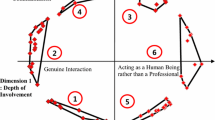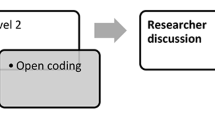Abstract
The purpose of this phenomenological study was to explore the common experience of Korean counseling professionals who returned to South Korea after obtaining their doctoral degrees in the United States. Individual semi-structured interviews were conducted with ten Korean counseling professionals to understand their cross-cultural experience. The data were analyzed by phenomenological methods of inquiry. Seven themes emerged from the analyses: Reminiscence, Differences and Comparisons, Benefits, Challenges, Coping, Application and Modification, and Meaning. The findings suggested how the setting and context in which the reentry process occurred contributed to the participants’ experience as well as the essence of the reentry process. Implications of the results are discussed in the light of cross-cultural counseling and for future research and practice.
Similar content being viewed by others
Notes
The term ‘counseling professionals’ is intentionally used here to refer to individuals with a doctoral degree in counseling and counseling-related areas, such as counseling psychology, counselor education, school counseling, and family therapy.
References
American Psychological Association. (2003). Guidelines on multicultural education, training, research, practice, and organizational change for psychologists. American Psychologist, 58, 377–402.
Arredondo, P. (1999). Multicultural counseling competencies as tools to address oppression and racism. Journal of Counseling and Development, 77, 102–108.
Bassett, R. H. (Ed.). (2005). Parenting and professing: Balancing work with an academic career. Nashville: Vanderbilt University Press.
Berry, J. W. (1997). Immigration, acculturation, and adaptation. Applied Psychology: An International Review, 46, 5–68.
Black, J. S., Gregersen, H. B., & Mendenhall, M. E. (1992). Toward a theoretical framework of repatriation adjustment. Journal of International Business Studies, 23, 737–760.
Christofi, V., & Thompson, C. L. (2007). You cannot go home again: a phenomenological investigation of returning to the sojourn country after studying abroad. Journal of Counseling & Development, 85, 53–63.
Coogan, P. A., & Chen, C. P. (2007). Career development and counseling for women: connecting theories to practice. Counseling Psychology Quarterly, 20, 191–204.
Cox, B. J. (2004). The role of communication, technology, and cultural identity in repatriation adjustment. International Journal of Intercultural Relations, 28, 201–219.
Creswell, J. W. (2007). Qualitative inquiry & research design: Choosing among five approaches (2nd ed.). Thousand Oaks: Sage.
Creswell, J. W. (2009). Research design: Qualitative, quantitative, and mixed methods approaches. Thousand Oaks: Sage.
Duan, C., Nilsson, J., Wang, C., Debernardi, N., Klevens, C., & Tallent, C. (2011). A few Southeast Asian perspectives on internationalizing counseling to Southeast Asia. Counseling Psychologist Quarterly, 24, 1–13.
Gerstein, L. H., Heppner, P. P., Ægisdóttir, S., Leung, S. A., & Norsworthy, K. L. (2009). Cross-cultural counseling: History, challenges, and rationale. In L. H. Gerstein, P. P. Heppner, S. Ægisdóttir, S. A. Leung, & K. L. Norsworthy (Eds.), International handbook of cross-cultural counseling (pp. 3–32). Thousand Oaks: Sage.
Gullahorn, J. T., & Gullahorn, J. E. (1963). An extension of the U-curve hypothesis. Journal of Social Issues, 19, 33–47.
Heppner, P. P., Leong, F. T. L., & Chiao, H. (2008). The growing internationalization of counseling psychology. In S. D. Brown & R. W. Lent (Eds.), Handbook of counseling psychology (4th ed., pp. 68–85). New York: Wiley.
Kasai, M. (2009). The role of Japanese culture in psychological health. In L. H. Gerstein, P. P. Heppner, S. Ægisdóttir, S. A. Leung, & K. L. Norsworthy (Eds.), International handbook of cross-cultural counseling (pp. 159–172). Thousand Oaks: Sage.
Kim, C., Kim, D. M., Seo, Y. S., & Kim, K. H. (2009). Professional accomplishments and current cultural challenges of counseling psychology in South Korea. In L. H. Gerstein, P. P. Heppner, S. Ægisdóttir, S. A. Leung, & K. L. Norsworthy (Eds.), International handbook of cross-cultural counseling (pp. 173–182). Thousand Oaks: Sage.
Leung, S. A. (2003). A journey worth traveling: globalization of counseling psychology. The Counseling Psychologist, 31, 412–419.
Leung, S. A. (2007). Returning home and issues related to “revere culture shock”. In H. D. Singaravelu & M. Pope (Eds.), Handbook on counseling international students (pp. 137–151). Alexandria: American Counseling Association.
Leung, F. T. L., & Ponterotto, J. G. (2003). A proposal for internationalizing counseling psychology in the United States. The Counseling Psychologist, 31, 381–395.
Leung, S. A., Clawson, T., Norsworthy, K. L., Tena, A., Szilagyi, A., & Rogers, J. (2009). Internationalization of the counseling profession: An indigenous perspective. In L. H. Gerstein, P. P. Heppner, S. Ægisdóttir, S. A. Leung, & K. L. Norsworthy (Eds.), International handbook of cross-cultural counseling (pp. 111–124). Thousand Oaks: Sage.
MacDonald, S., & Arthur, N. (2003). Employees’ perceptions of repatriation. Canadian Journal of Career Development, 2, 3–11.
Merleau-Ponty, M. (1962). Phenomenology of perception (C. Smith, Trans.). London: Routledge & Kegan Paul.
Morales, A., & Green, D. O. (2007). Conducting qualitative research with Mexican immigrant families. Unpublished manuscript, University of Nebraska Lincoln.
Moustakas, C. E. (1994). Phenomenological research methods. Thousand Oaks: Sage.
Norsworthy, K. L. (2006). Brining social justice to international practice of counseling psychology. In R. L. Toporek, L. H. Gerstein, N. A. Fouad, G. Roysircar-Sodowsky, & T. Israel (Eds.), Handbook for social justice in counseling psychology: Leadership, vision, and action (pp. 421–441). Thousand Oaks: Sage.
Norsworthy, K. L., Leung, S. A., Heppner, P. P., & Wang, L. (2009). Crossing borders in collaboration. In L. H. Gerstein, P. P. Heppner, S. Ægisdóttir, S. A. Leung, & K. L. Norsworthy (Eds.), International handbook of cross-cultural counseling (pp. 125–140). Thousand Oaks: Sage.
Ojeda, L., Flores, L. Y., Rosales, R., & Morales, A. (2011). Culturally competent qualitative research with Latino immigrants. Hispanic Journal of Behavioral Sciences, 33, 184–203.
Onwumechili, C., Nwosu, P. O., Jackson, R., & James-Hughes, J. (2003). In the deep valley with mountains to climb: exploring identity and multiple reacculturation. International Journal of Intercultural Relations, 27, 41–62.
Pedersen, P. B. (1999). Culturally biased assumptions in counseling psychology. The Counseling Psychologist, 31, 396–403.
Rohrlich, B. F., & Martin, J. N. (1991). Host country and reentry adjustment of student sojourners. International Journal of Intercultural Relations, 15, 163–182.
Savickas, M. L. (2007). Internationalization of counseling psychology. Applied Psychology: An International Review, 56, 182–188.
Spiegelberg, H. (1982). The phenomenological movement (3rd ed.). The Hague: Martinus Nijhoff.
Sussman, N. M. (2000). The dynamic nature of cultural identity throughout cultural transitions: why home is not so sweet. Personality and Social Psychology Review, 4, 355–373.
Sussman, N. M. (2001). Repatriation transitions: psychological preparedness, cultural identity, & attributions among American managers. International Journal of Intercultural Relations, 25, 109–123.
Sussman, N. M. (2007). Identity shifts as a consequence of crossing cultures: Hong Kong Chinese migrants return home. In K. B. Chan, J. W. Walls, & D. Hayward (Eds.), East–west identities: Globalization, localization, & hybridization (pp. 121–147). Leiden: Brill.
Szkudlarek, B. (2010). Reentry—a review of the literature. International Journal of Intercultural Relations, 34, 1–21.
Thompson, C. L., & Christofi, V. (2006). Can you go home again? A phenomenological investigation of Cypriot students returning home after studying abroad. International Journal for the Advancement of Counseling, 28, 21–39.
Uehara, A. (1983). The nature of American student re-entry adjustment and perceptions of the sojourner experience. International Journal of Intercultural Relations, 10, 415–438.
Wang, L., & Heppner, P. P. (2009). Cross-cultural collaboration. In L. H. Gerstein, P. P. Heppner, S. Ægisdóttir, S. A. Leung, & K. L. Norsworthy (Eds.), International handbook of cross-cultural counseling (pp. 141–154). Thousand Oaks: Sage.
Author information
Authors and Affiliations
Corresponding author
Additional information
Ae-Kyung Jung and Hang-Shim Lee contributed equally to this work.
Appendix
Appendix
Interview protocol
-
1.
Tell me about your current work.
-
2.
What made you decide to reenter your home country?
-
3.
As a professional with cross-cultural experience who trained in the States, what are the benefits to coming back to South Korea?
-
a.
Is there any benefit in research?
-
b.
Is there any benefit in teaching and advising?
-
c.
Is there any benefit in practice?
-
a.
-
4.
Can you tell me about your challenges to coming back to Korea?
-
a.
Is there any challenge in research?
-
b.
Is there any challenge in teaching and advising?
-
c.
Is there any challenge in practice?
-
a.
-
5.
How did you cope with those challenges?
-
6.
As a female/male professional, how has cross-cultural experience and training in the States affected you?
-
a.
Is there any advantage?
-
b.
Is there any disadvantage?
-
a.
-
7.
Can you tell me how you dealt with the challenges?
-
8.
In the process of coming back to Korea, how has your family affected you?
-
9.
What is it like for you to come back to Korea as a professional?
-
10.
What suggestions, if any, would you recommend to future counseling psychologists who are preparing for their re-entry?
-
11.
After reflecting on your experience, what three words would you use to summarize and describe your overall experience?
-
a.
How do you define the word ‘ ________ ?’
-
a.
-
12.
Is there anything else we did not talk about that you feel would be important for me to know?
Rights and permissions
About this article
Cite this article
Jung, AK., Lee, HS. & Morales, A. Wisdom from Korean Reentry Counseling Professionals: A Phenomenological Study of the Reentry Process. Int J Adv Counselling 35, 153–171 (2013). https://doi.org/10.1007/s10447-012-9174-4
Published:
Issue Date:
DOI: https://doi.org/10.1007/s10447-012-9174-4




